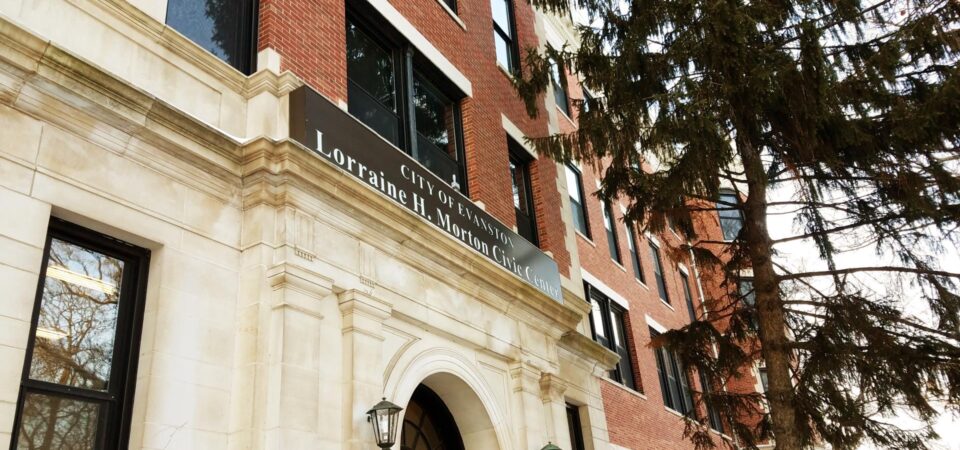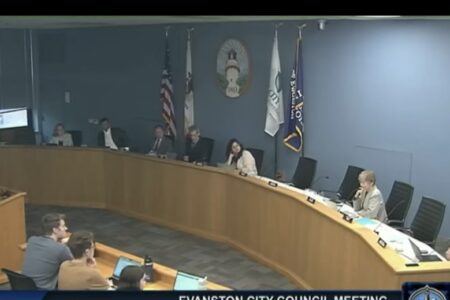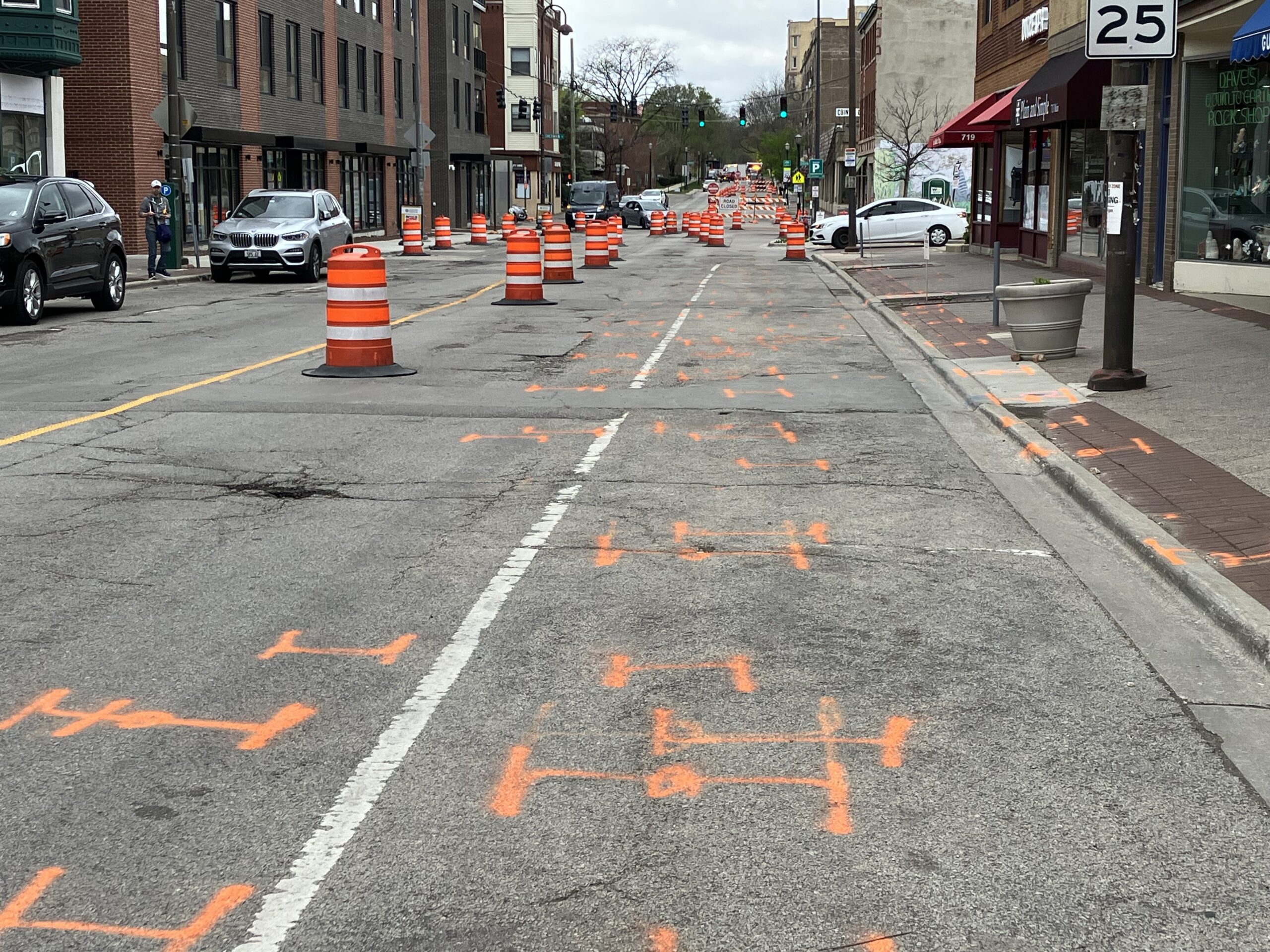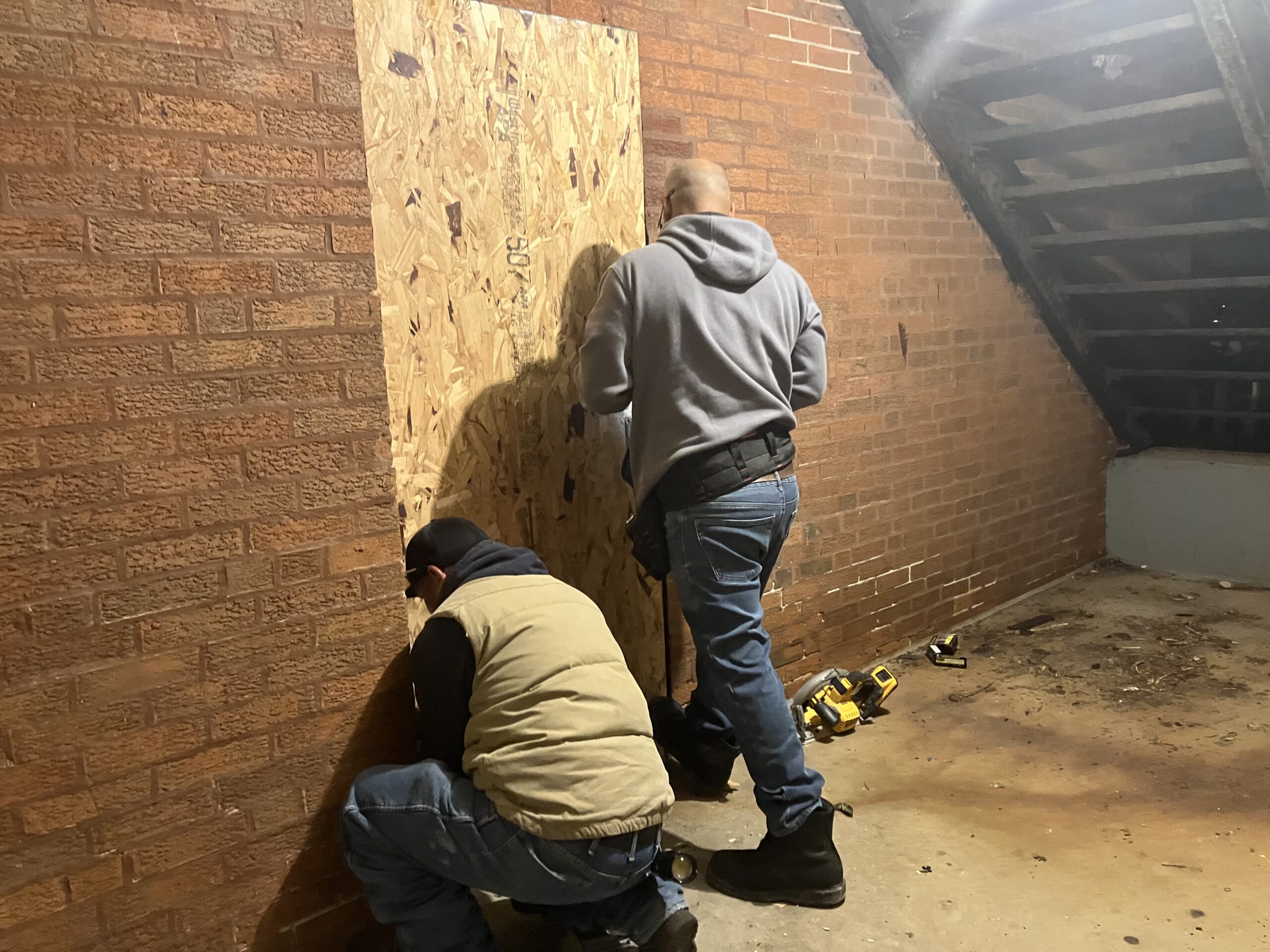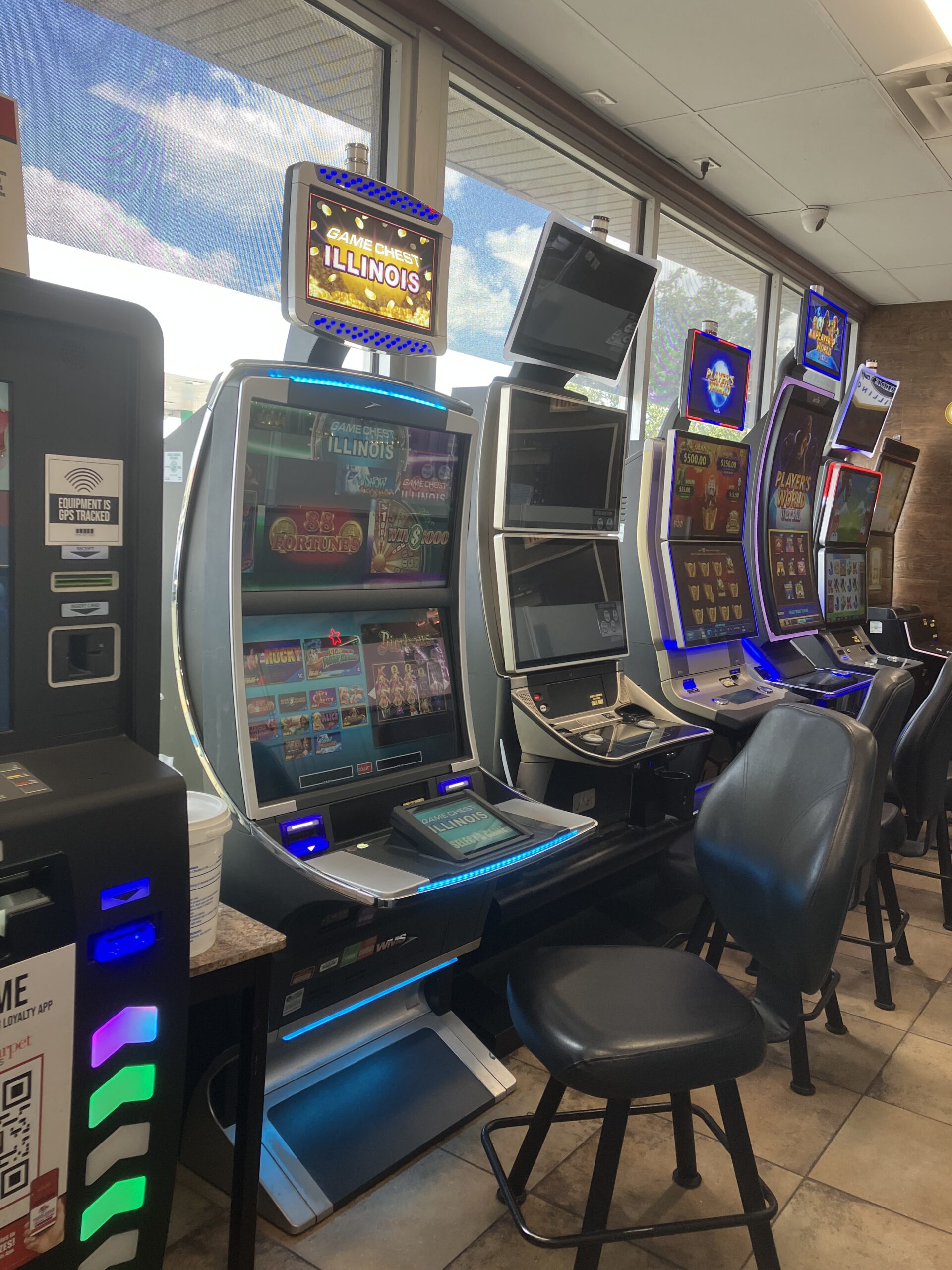By Bob Seidenberg
The city’s Human Services Committee backed a City Council member’s request of $1.75 million from the General Fund to bring together a number of services to address homelessness, with special emphasis on the encampments that have arisen around Howard Street and elsewhere.
Committee members voted 4-1 to move the issue to the full council for its Sept. 11 meeting but with the condition that the allocation could be changed based on the council’s discussion.
Council Member Devon Reid (8th Ward) spoke to the need to develop a plan at the end of the council’s Aug. 3 session.
Reid put council members on notice that “there are 15 to 20 unhoused people who have severe substance abuse issues who have formed an encampment in the city of Evanston on Howard Street.
“I know none of us would find this acceptable in their wards, that there was a 20-person homeless encampment that is akin to what is going on Skid Row and in Los Angeles,” he said.
At the Aug. 21 meeting, he differentiated the group from homelessness encountered downtown, “where there’s maybe a single person who’s kind of set up shop and hanging out … but here this is a group of 15 to 20-some-odd people who are cycling through here and from the conversations I’ve had, some of them are Evanston residents, they grew up here, they went to high school here, they have severe addiction issues.”
Since alerting the council, Reid has convened and organized meetings with city staff and multiple organizations about the issue, reported Ike Ogbo, the city’s Health and Human Services director.
The groups included Peer Services, Connections for the Homeless, the CTA, the office of Chicago’s 49th Ward alderman, and the City of Chicago Department of Family Support Services, with the aim of “coordinating efforts to deliver necessary aid to the unhoused population at the Howard viaduct,” Ogbo wrote.
Further, he reported that Mayor Daniel Biss, Fourth Ward Council Member Jonathan Nieuwsma and Reid met with the Evanston Police Department, other city staff and Connections for the Homeless “to further coordinate resources and efforts.”
At present, he said, there are four homeless encampments in Evanston, the largest located on Howard Street, with approximately 20 members.
‘Multi-faceted response’ suggested
Ogbo said the fundamental elements of a coordinated approach to address the Howard encampment and other homelessness and encampments include:
“1) Securing and funding housing rapid response events.
2) Offering drug treatment and medication.
3) Providing case management services.
4) Engaging public safety options for those who decline assistance.
5) Activating spaces where large encampments have previously existed.
6) Providing adequate lighting in the vicinity for security and safety purposes.
“A locally focused effort would be beneficial, by creating a multi-faceted response team that encompasses a group of specialists who locate and engage unhoused individuals, including those with mental health and substance-abuse issues,” Ogbo wrote in his memo. “The team may have to create a schedule to visit the encampments on a time basis that is deemed appropriate in order to gain the trust of the unhoused population and build relationships.
Building relationships and trust is crucial in convincing the unhoused to accept housing services and referrals. In general, the homeless population may be difficult to convince to receive services and then manage their many needs on an ongoing basis. When eventually housed, the participants will still require supervision and regular visits, plus mental health and substance abuse prevention support.”
Ogbo’s memo continues, “The effort to alleviate the homeless situations at the identified locations requires time and availability of specific programs plus resources that address the need,” he wrote. “This will also require adopting best practices that have worked in other jurisdictions and as well seeking legal counsel regarding the applicability of these practices or laws, including emerging law cases.”
Lead role for Connections for the Homeless
Of the $1.75 million to be allocated, $1.25 million is recommended to go to Connections for the Homeless, the Evanston-based group that operates the Margarita Inn and has a history of advocacy work for the homeless that goes back more than 40 years.
The allocation covers a number of services that Connections is currently providing; Ogbo’s memo listed the following:
- “Eviction prevention ($200,000),
- “Community and shelter ($260,000 to support more than 1,000 Evanston residents),
- “Healthcare services ($170,000 for clinical services, anticipating more than 9,000 engagements),
- “Aftercare services ($271,000 targeting more than 550 Evanston residents), and
- “A youth program ($330,000 to aid around 370 Evanston youth.”
Ogbo wrote, “At the request of Councilmember Reid, Connections for the Homeless assembled a special request for consideration of the Human Services Committee to continue to tackle the growing needs of our Evanston unhoused populations.
“Connections for the Homeless are professionals in this field and have for years provided comprehensive and effective programs to address homelessness in the community.”
The funding request would also include $200,000 for Evanston/Skokie School District 65 for essential support to students and their families facing or at risk of homelessness; and $300,000 for the city’s Health and Human Services Department for enhancements to current programs and to create a flexible funding model to address a spectrum of homelessness prevention necessities, according to the proposal.
Geracaris: ‘How are we going to pay?’
In discussion at the committee meeting, Council Member Juan Geracaris (9th Ward) said he supports setting aside this chunk of money.
“The one key thing for me is, ‘How are we going to pay for it?’” he said.
To that end, Geracaris said he would like to see a report from the city’s finance department to see where the city is on its revenues.
“One of the things I think that I have learned over the last few years is how expensive it is to house people who are unhoused,” he said. “And I think the prevention portion of this is very cost-effective.”
Council Member Krissie Harris (2nd Ward) chairing the meeting, though, said she is “not comfortable” with the funding allocation, which was developed in less than a month when Reid first announced the presence of the encampment.
“I’m being real clear about that. I’m not comfortable,” she said. “I didn’t know we were magicians, so I don’t know where we’re going to pull that from and maybe hearing that [the cost figure] gives me great concern.”
She stressed she was “not saying we don’t need it. I just don’t know where we are going to get it.”
Further, she said she preferred officials “look greater inward than outward,” in providing the services to address the emerging problem.
Burns wants ‘targeted effort’
Council Member Bobby Burns (5th Ward) said he understood the need driving the plan.
“I just want to make sure that we come out of this, though, with a targeted effort to address our homeless encampments,” he said.
In Connection’s case, he said, that would mean “they have staff people that have the capacity in addition to their current workload, that they can literally go out and be with people on a consistent basis who are in these homeless encampments.”
“If we can’t do that,” he said, “we are just continuing to support well-deserved organizations, but it won’t necessarily lead to a reduction in what we’re seeing as the homeless encampments.”
He added, “You know, whenever we figure out what we’re going to do in services, housing, it’s going to take time. So, the question becomes, are we going to allow this to continue the way it is now until we find permanent housing? Do we have a plan to put people in temporary housing? I don’t know if we’ve determined how many people are out there but are we going to put people in temporary housing, hotels, motels, etc.? I’m looking for a plan to address the very specific issue, which is homeless encampments.”
Reid responded, “What the plan does, with some of these programs we get more bang for our buck, doing homeless prevention.”
He said that funding for Connections includes “support for programs that are not new programs, but this allows the continuation of programs that are critical and Connections has committed to prioritizing outreach to folks who are in encampments.”
Harris cast the lone “no” vote as her colleagues voted to send the issue on to the council on Sept. 11.
